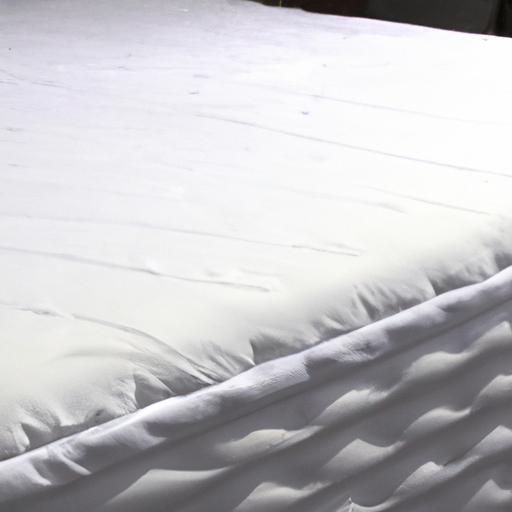When it comes to the lifespan of our trusty mattress, we often seek to extend its suitability as long as possible – flipping it, rotating it, maybe even sprinkling it with a bit of magic. But what about the unsung hero of our bedding regimen – the mattress protector? We may not give it the attention it deserves, but this humble yet mighty layer plays a crucial role in safeguarding our beloved mattresses from spills, stains, and all manner of unexpected accidents. So, how long should a mattress protector actually last? In this article, we’ll uncover the secrets behind the durability of mattress protectors and provide you with some handy tips on when it might be time for a replacement.
Review contents
Factors That Influence the Lifespan of a Mattress Protector
Quality of Materials Used
The quality of materials used in a mattress protector plays a significant role in determining its lifespan. Higher-quality materials, such as premium fabrics and durable waterproof coatings, are more likely to withstand regular wear and tear over time. Investing in a mattress protector made with high-quality materials can ensure that it will last longer and provide effective protection for your mattress.
Frequency of Use
The frequency of use also affects the lifespan of a mattress protector. Mattress protectors that are used on a daily basis, such as in households with children or pets, are more likely to experience wear and tear compared to those used less frequently. Regular use can lead to stretching, tearing, or fabric thinning, which may shorten the lifespan of the protector. However, with proper care, even frequently used mattress protectors can last for a considerable amount of time.
Maintenance and Cleaning
Proper maintenance and cleaning routines are essential for prolonging the lifespan of a mattress protector. Following the manufacturer’s instructions for cleaning and care can help prevent damage and ensure the protector remains in good condition. Regular cleaning removes dust, allergens, and stains, preventing them from accumulating and potentially causing damage. By regularly cleaning and maintaining your mattress protector, you can help extend its lifespan and provide continued protection for your mattress.
Type of Mattress Protector
The type of mattress protector also influences its lifespan. Different materials and designs have varying levels of durability and longevity. Understanding the different types of mattress protectors can help you choose one that best suits your needs and has a longer lifespan.
Expected Lifespan of Different Types of Mattress Protectors
Cotton Mattress Protectors
Cotton mattress protectors are a popular choice due to their softness, breathability, and natural properties. On average, a high-quality cotton mattress protector can last anywhere from 2 to 5 years with proper care. However, it’s important to note that cotton protectors are more susceptible to staining and may require more frequent cleaning, which can affect their lifespan.
Polyester Mattress Protectors
Polyester mattress protectors are known for their durability, resilience, and affordability. These protectors can generally last between 3 to 7 years, depending on the quality of the polyester used. Regular cleaning and proper maintenance can help prolong the lifespan of polyester mattress protectors, making them a cost-effective option.
Vinyl Mattress Protectors
Vinyl mattress protectors are waterproof and highly resistant to stains, making them an excellent choice for those looking to protect their mattress from spills and accidents. These protectors tend to have a longer lifespan compared to other materials and can last anywhere from 5 to 10 years. However, vinyl protectors may not be as breathable as other options and can sometimes produce a plastic-like sound when moving, which some users may find less comfortable.
Waterproof Mattress Protectors
Waterproof mattress protectors are specifically designed to provide an extra layer of protection against spills, stains, and liquid damage. These protectors are often made with materials like polyurethane or vinyl that repel liquids and prevent them from seeping into the mattress. With proper care and cleaning, waterproof mattress protectors can last between 5 to 10 years, depending on the quality of the materials used.
Signs That Indicate It’s Time to Replace a Mattress Protector
Visible Wear and Tear
One of the most obvious signs that it’s time to replace a mattress protector is visible wear and tear. This includes thinning or fraying fabric, holes or tears, or stretched-out elastic bands. These signs indicate that the protector is no longer providing adequate protection and may need to be replaced.
Unpleasant Odors
Another sign that a mattress protector needs to be replaced is the presence of unpleasant odors. Over time, stains, spills, and sweat can accumulate, leading to the growth of bacteria and the development of unpleasant smells. If regular cleaning doesn’t eliminate these odors, it may be time to invest in a new mattress protector.
Allergic Reactions or Skin Irritation
If you notice that you or your family members are experiencing allergic reactions or skin irritation after using a mattress protector, it could be a sign that it needs to be replaced. Allergens, dust mites, and mold can accumulate in an old or deteriorating protector, leading to respiratory issues or skin problems. Replacing the protector can help alleviate these symptoms and ensure a healthier sleep environment.
Difficulties in Cleaning
If you find that your mattress protector is becoming increasingly difficult to clean or that stains and spills are not coming out as easily as before, it may be time to consider replacing it. A worn-out protector may lose its waterproof or stain-resistant properties, making it less effective in protecting your mattress and requiring more effort to keep clean.
Decreased Effectiveness in Protecting the Mattress
If your mattress is starting to show signs of wear and tear despite using a protector, it’s a clear indication that the protector is no longer providing adequate protection. Over time, a deteriorating protector may develop leaks, tears, or cracks, allowing spills, stains, dust, or allergens to reach and damage the mattress. When the protector’s effectiveness diminishes, it’s essential to replace it to maintain the longevity of your mattress.
Extending the Lifespan of a Mattress Protector
Using a Fitted Sheet Over the Mattress Protector
Adding a fitted sheet over your mattress protector can offer an additional layer of protection, helping to preserve the lifespan of the protector. The fitted sheet serves as a barrier against stains, spills, and sweat, reducing the direct contact between your body and the protector. This extra layer can help distribute the wear and tear more evenly and add an extra level of comfort to your sleeping experience.
Proper Washing and Drying Techniques
Following the manufacturer’s instructions for washing and drying your mattress protector is crucial for maintaining its lifespan. Different protectors may have specific care requirements, such as using a delicate or gentle cycle, avoiding high heat or tumble drying, or limiting the use of certain chemicals. By following these guidelines, you can prevent damage to the protector’s materials and ensure it remains in good condition for a longer period.
Avoiding Excessive Heat Exposure
Excessive heat exposure can damage the materials of a mattress protector, compromising its effectiveness and shortening its lifespan. Avoid placing your protector near direct heat sources, such as radiators or heaters, and refrain from using high-temperature settings when ironing or drying it. Heat can cause shrinkage, melting, or degradation of the materials, leading to reduced protection and durability.
Regularly Inspecting for Damage
Periodically inspecting your mattress protector for signs of damage or wear and tear is essential for catching any issues early on. By closely examining the protector, you can identify small tears, holes, or stains and address them promptly. Regular inspections also allow you to assess the overall condition of the protector and make an informed decision about when it may be time to replace it.
Avoiding Chemicals and Harsh Cleaning Products
Using harsh cleaning products or chemicals can degrade the materials of your mattress protector and reduce its lifespan. Instead, opt for gentle, non-abrasive cleaners specifically formulated for delicate fabrics. Additionally, avoid using bleach or other strong detergents that can weaken the protector’s waterproof or stain-resistant properties. By choosing gentle cleaning products, you can maintain the integrity and effectiveness of your protector for a longer time.
Advantages of Using a Mattress Protector
Protection Against Stains and Spills
One of the most significant advantages of using a mattress protector is its ability to protect against stains and spills. Accidents happen, and having a protective barrier between your mattress and potential spills can save you the stress and expense of trying to remove stubborn stains. Whether it’s a glass of wine, a cup of coffee, or an accidental bedwetting incident, a mattress protector acts as a shield, preventing liquids from seeping into the mattress fabric and causing permanent damage.
Prevention of Dust Mites and Allergens
Another important benefit of using a mattress protector is its ability to prevent the accumulation of dust mites and allergens. Dust mites are microscopic creatures that feed on dead skin cells and thrive in warm, moist environments like mattresses. They can be a major source of allergies and respiratory issues. A mattress protector acts as a barrier, preventing dust mites from penetrating the mattress and reducing the risk of allergic reactions and respiratory problems.
Increased Hygiene
Using a mattress protector enhances the overall hygiene of your sleeping environment. Mattresses can harbor sweat, oils, dead skin cells, and bodily fluids, creating an ideal breeding ground for bacteria, fungi, and other microorganisms. A mattress protector acts as a shield, preventing these substances from seeping into the mattress and making it more challenging to clean. By using a mattress protector, you can maintain a cleaner and more hygienic sleeping environment for you and your family.
Enhanced Comfort
In addition to providing protection, a mattress protector can also enhance your comfort while sleeping. Some protectors are designed with features such as extra cushioning, temperature regulation, or moisture-wicking properties, which can contribute to a more comfortable sleep experience. By adding an extra layer of comfort, a mattress protector can help improve the quality of your sleep and ensure you wake up feeling refreshed.
Prolonged Lifespan of the Mattress
Perhaps one of the most significant advantages of using a mattress protector is its ability to extend the lifespan of your mattress. A high-quality protector acts as a protective barrier, shielding the mattress from spills, stains, dust, and allergens that can cause damage or deterioration over time. By investing in a mattress protector, you can help preserve the integrity and longevity of your mattress, ensuring it remains in excellent condition for years to come.
Conclusion
A mattress protector is an essential accessory that can prolong the life of your mattress and provide added comfort and protection. Factors such as the quality of materials used, frequency of use, and proper maintenance all influence the lifespan of a mattress protector. Different types of protectors, including cotton, polyester, vinyl, and waterproof options, offer varying levels of durability. Recognizing the signs that indicate it’s time to replace a mattress protector, such as visible wear and tear or unpleasant odors, can help maintain a healthy and hygienic sleep environment. By following proper care techniques and implementing strategies to extend the protector’s lifespan, such as using a fitted sheet or avoiding excessive heat exposure, you can maximize its effectiveness and longevity. The advantages of using a mattress protector, including stain prevention, allergen resistance, increased hygiene, enhanced comfort, and prolonged mattress lifespan, make it a worthwhile investment for anyone looking to protect their sleep surface.




















